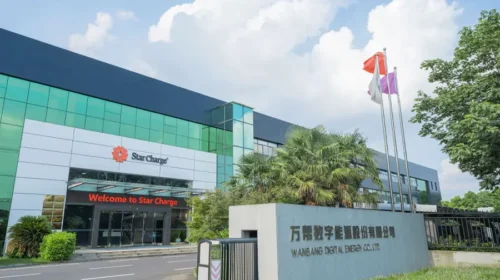Deltaphone plans Hong Kong IPO amid clearing path to profitability

The AIoT solutions provider, whose investors include China Merchants Group, switched its sights to Hong Kong after previously filing to list in the domestic A-shares market
Key Takeaways:
- Deltaphone Technology has applied to list in Hong Kong, reporting its losses narrowed significantly in the first half of 2025
- The AIoT solutions provider boasts a strong client roster, including State Grid Corp. of China and the country’s three major state-owned oil giants
By Bai Xin Rui
The explosive growth of AI is injecting fresh momentum across industries, with many companies bending over backwards to show how they’re using the technology to boost their efficiency. One sector putting AI to such use is big industrial companies, a key customer group that industrial AIoT solutions provider Beijing Deltaphone Technology Co. Ltd. hopes will power it to a strong valuation with its recently filed plan to list in Hong Kong.
While AI has only recently captured investor fancy, Deltaphone’s work in the space dates back a decade. The trio of Wang Qingjie, Teng Xuejun, and Dong Xiaodong, founded the company in the coastal city of Hangzhou in 2015 as operator of an AIoT software platform for production optimization. They later went on to provide project services for China’s leading power grid operators.
As its business expanded, the company attracted an A-list of investors, including the venture capital arms of China Merchants Group and the international arm of banking giant Bank of Communications. Chairman Wang Qingjie remains the largest shareholder with a 27.7% stake.
A-share listing shelved
Deltaphone originally planned to list on one of China’s domestic A-share markets in Shanghai or Shenzhen, before halting those efforts a year ago and resetting its course for Hong Kong. It cited Hong Kong’s direct access to international markets, ability to attract a broader investor base, and the potential to enhance its corporate profile, credibility, and competitiveness as reasons for the switch.
The company’s core business centers on the AI internet of things (AIoT) as used by industrial customers, which involves deploying AI, IoT, and other advanced technologies to process companies’ massive troves of data collected, often in real-time, by sensors and equipment. Deltaphone says its end-to-end solutions allow clients to make decisions on industrial processes and infrastructure based on real-time data, thereby boosting operational efficiency, quality and flexibility.
Its businesses span three core areas: energy management, as well as health, safety, environment and quality (HSEQ), and smart manufacturing. Energy management and HSEQ are its most profitable businesses, accounting for 91.6% of its gross profit in 2024 and 86.7% in the first half of 2025.
Energy management entails installing sensors, smart meters and control devices across dispersed locations to monitor and analyze real-time energy consumption, allowing operators to reduce costs. HSEQ leverages sensors, connected devices, and analytics for real-time monitoring and hazard detection in industrial settings.
While energy management and HSEQ are Deltaphone’s two biggest businesses, the former has been a recent underperformer. Energy management revenue growth slowed to just 1.6% in 2024, reaching 203 million yuan ($28.6 million). Then, it plunged 46.1% year-on-year to 49.55 million yuan in the first of this year due to reduced business from data and AI centers. HSEQ fared better by securing business from another growing area, smart cities. That segment’s revenue surged 97.4% to 268 million yuan in 2024, and skyrocketed 554% year-on-year to 95.74 million yuan in the first half of this year to account for 60% of total revenue. That big increase drove a 38.8% year-on-year increase in the company’s overall revenue to 159 million yuan for the first half of this year.
Despite the strong overall revenue growth and its 9.9% market share for independent professional AIoT platforms in China’s energy sector – ranking it third among its peers – Deltaphone posted a loss of 39.93 million yuan in the first half of this year. That marked a 78.8% narrowing from a year earlier, showing the company is moving ever closer to overall profitability. Deltaphone is playing in a large and fast expanding Chinese AIoT market that was worth 111.9 billion yuan in 2024 and is projected to double to 220.9 billion yuan by 2029, fueled by widespread adoption of 5G and AI technologies.
The HSEQ segment, in particular, offers significant potential. The company’s solutions can integrate inspection robots and drones to enable real-time data collection in hazardous environments, enhancing personnel safety and reducing equipment downtime compared to traditional methods. The HSEQ market was worth an estimated 14.5 billion yuan in 2024, and is expected to more than double to approximately 32.7 billion yuan by 2029, according to third-party data in Deltaphone’s listing document.
Strong second halves
The company is quite subject to seasonality, with sales typically stronger in the second half of the year. This stems largely from Deltaphone’s historic reliance on big industrial customers that are typically state-owned. Its client roster includes companies engaged in power and utilities, oil and gas, and tobacco, including China’s power grid duopoly, its three oil majors, and the state tobacco monopoly – which all generally settle their payments in the latter part of the year.
The company is trying to lower its dependence on the state sector, with relatively strong results. Revenue from state entities fell from 78% of its total in 2023 to 74% last year, and just 53.4% in the first half of 2025. The private sector’s contribution has surged to account for the rest, including 46.6% of revenue in the first half of this year. Such a diversification strategy aims to broaden the company’s private client base and reduce its overreliance on state-owned entities.
Deltaphone looks like a relatively solid bet overall, combining the potent themes of AIoT, artificial intelligence, and robotics. Demand for its services looks strong, with the company boasting an order backlog of 296 million yuan at the end of June this year. Robotics peers like Ubtech (9880.HK) and Dobot (2432.HK) trade at price-to-sales (P/S) ratios of 16.9 times and 29 times, respectively, even as both may struggle to turn a profit in the next two years. By comparison, Deltaphone, with its rapid approach to profitability, could prove more appealing, and could hold significant investor allure if it prices its shares below a P/S ratio of 15.
To subscribe to Bamboo Works weekly free newsletter, click here





